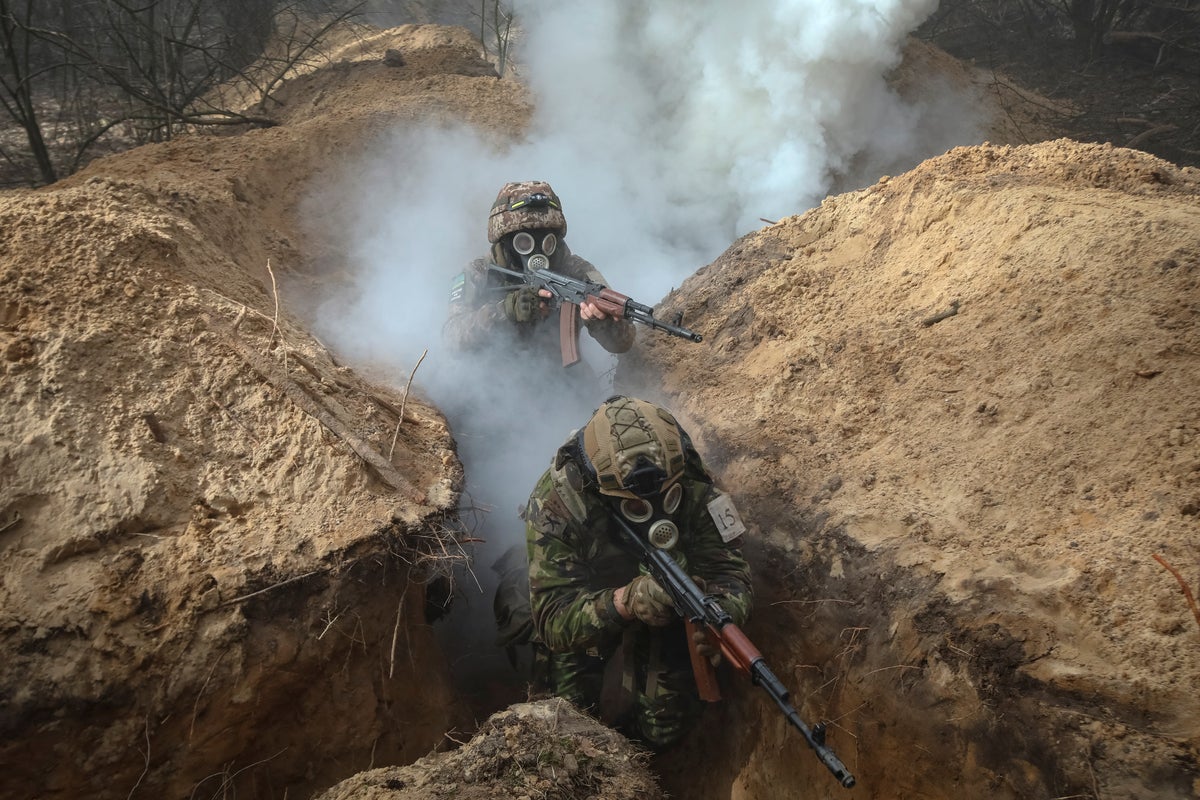
Russia has been accused by European intelligence agencies of “widespread” use of banned chemical weapons in Ukraine.
While it was already accused of using tear gas in its three-year war in Ukraine, German and Dutch intelligence agencies say Moscow has expanded its use of chemical weapons on the battlefield, including the use of potentially-lethal chemical choking agent chloropicrin.
Dutch intelligence said the chemical is dropped from Russian drones to force soldiers out of trenches so they can be shot, as Russia looks to continue making gains on the battlefield despite international efforts towards peace.
The chemical, which was widely used during World War One, can cause irritation of the lungs, eyes and skin and can cause diarrhoea, vomiting and nausea.
“The main conclusion is that we can confirm Russia is intensifying its use of chemical weapons,” Dutch defence minister Ruben Brekelmans told Reuters, as he called for tougher sanctions for Moscow.
“This intensification is concerning because it is part of a trend we have been observing for several years now, where Russia’s use of chemical weapons in this war is becoming more normalized, standardized, and widespread.”
Germany’s BND foreign intelligence agency said Russia has been using not only tear gas but also “the more dangerous chemical chloropicrin, which can be lethal in high concentrations in enclosed spaces”. This is a more serious violation of the Chemical Weapons Convention, it added.
European intelligence officials fear that Russia’s chemical weapons use is part of a large-scale intensification of chemical weapons production, and that Russian officials are issuing direct instructions to soldiers to use the poisonous warfare agents.
Russian chemical weapons use is “truly part of a large scale programme” rather than “some ad-hoc tinkering at the frontline”, said Peter Reesink, the head of the Dutch military intelligence agency (MIVD).
The United States first accused Russia of using chloropicrin, a chemical compound more toxic than riot control agents, in May last year.
Kyiv has alleged thousands of instances of chemical weapons usage by Russian forces. The head of the Dutch Military Intelligence Agency (MIVD), Peter Reesink, noted “thousands of instances” of chemical weapons use, while also citing a Ukrainian figure of 9,000.
At least three Ukrainian deaths have been tied to chemical weapons use, Mr Brekelmans said, while more than 2,500 people injured on the battlefield reported chemical weapons-related symptoms to Ukrainian health authorities.
Moscow denies this, and has accused Ukraine itself of using such weapons. Russian foreign ministry spokeswoman Maria Zakharova said on Wednesday that its security service discovered a Ukrainian cache of explosive devices in the east of the country containing chloropicrin. Kyiv has consistently denied such allegations.
The Organisation for the Prohibition of Chemical Weapons (OPCW), a disarmament agency in The Hague with 193 member states, said last year that initial accusations levelled by both countries at each other were “insufficiently substantiated”.
Mr Brekelmans has now called on Western countries to “increase the pressure” on Russia including by “looking at more sanctions and specifically not allowing them (Russia) to participate in international bodies like the Executive Council of the OPCW”.
There have been previous allegations of Russian use of chemical weapons in Ukraine. The US said in May 2024 that Russia had used the chloropicrin agent, adding that it was not an isolated incident. Washington’s state department also said Moscow’s forces had used tear gas.
Moscow has repeatedly been accused by Western countries of using toxic chemical substances in foreign countries, including multiple suspected poisonings in the UK.
The poisoning of Sergei and Yulia Skripal in Salisbury, 2018, was a botched attempt to assassinate Sergei Skripal, a former Russian military officer and double agent for the British intelligence agencies. The Novichok nerve agent was used in their poisoning, but they survived after weeks in intensive care in hospital. The British government accused Russia of attempted murder.
Twelve years earlier, former Russian Federal Security Service officer Alexander Litvinenko was poisoned with Polonium-210 after fleeing Russia, criticising its government and working with foreign intelligence agencies.
